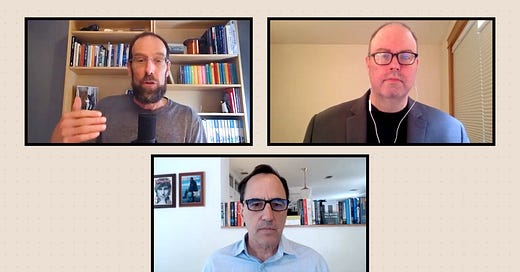Where Can Optimism Be Found?
A weekly update about hacking the skies, frightening spies, and exploring deep ties.
Hey friends,
The era we’ve entered is full of dire threats and muddled options.
Take geoengineering—the alteration of large-scale natural systems through intentional human interventions. Is geoengineering an adaptation solution, a research priority, a political prop in predatory delay, or a dangerous delusion driven by hubris? Or some combination of the above?
Rolling Stone’s Jeff Goodell invited me to discuss the future of geoengineering with Harvard scientist, David Keith. Keith is a leading proponent of solar geoengineering, which would attempt to control the warming of the planet by having fleets of airplanes spray aerosols into the upper atmosphere.
It’s a worthwhile conversation, and you can watch it here.
The main thing to remember about geoengineering—or any other large-scale proposals to manage our planetary crisis by doing harm and then seeking to reverse that harm—is that the problems we face are not ones that can be undone. As we overshoot the planet’s limits, we destroy or destabilize huge parts of complex, interconnected systems. Relieving the pressure on those systems will not return us to the world humanity once had. Even in the best, luckiest scenarios, we will live (effectively forever, in human time frames) on a permanently altered planet.
Our new world is full with worries.
As more and more people begin to grasp the speed and magnitude of the changes unfolding around us—not just climate, or ecosystems, or resource limits, or development challenges, but all those and increased conflict, powerful new technologies, political upheavals, and cultural reactions to paces of change that are hard to process—more and more experts are having their “oh, crap” moments.
Take the U.S. National Intelligence Council, which in its just-released quadrennial summary of emerging threats finds a world both more afflicted with planetary changes and less prepared to meet new challenges than perhaps ever before.
As the New York Times explains, “The gap between the challenges and the institutions meant to deal with them continues to grow, so that ‘politics within states are likely to grow more volatile and contentious, and no region, ideology, or governance system seems immune or to have the answers.’”
As someone said, the planetary crisis accelerates human upheavals.
We’re aswim in paradoxes around here, but one worth mulling a bit is that the path to optimism leads right through complicated interconnection, uncertainty, and fear.
You can find simple answers for sale cheap on any street corner. When you buy them, though, when you take them home and wind them up, what you find is that they fall apart the minute they meet the rambunctious toddler of reality.
Durable optimism—confidence in positive action—demands wrestling a bit with hydra-headed complexities: slippery, large, never entirely understood. Seeing clearly now demands abandoning all hope of continuity and orderliness and stepping instead into dynamism, exploration and entanglement.
That’s part of the job, now. Optimism can only be found by being truly at home in the world as it now is.
As a reminder, paying subscribers can listen to the podcasts I’ve been doing, outlining the main ideas in The Snap Forward, the new book I’ve written with Justus Stewart:
If you would like to further support this newsletter and gain access to these and upcoming podcasts, please become a paid subscriber. There are monthly and yearly options, and you can cancel at any time. Your support is greatly appreciated.
More soon, and thanks again for all your encouragement!
Swimmingly,
Alex




